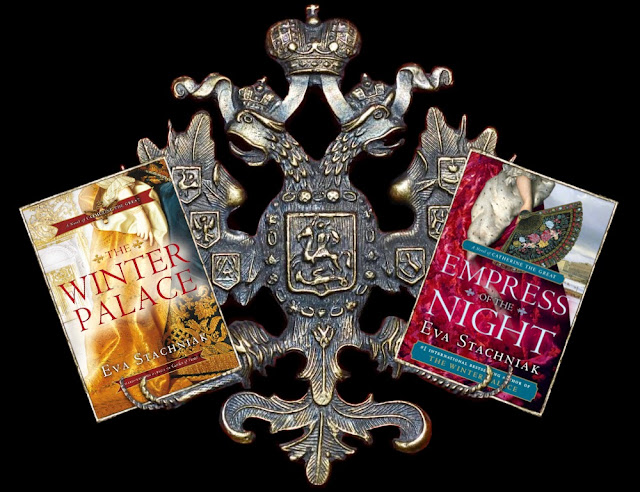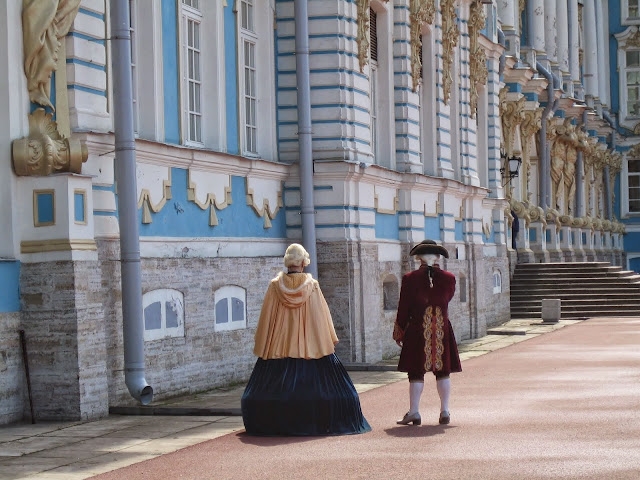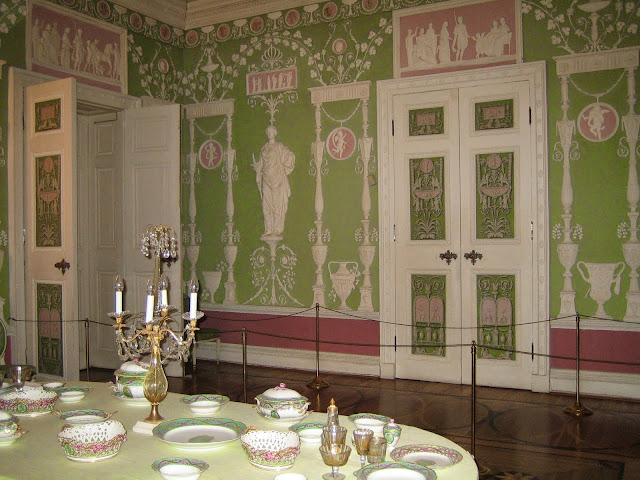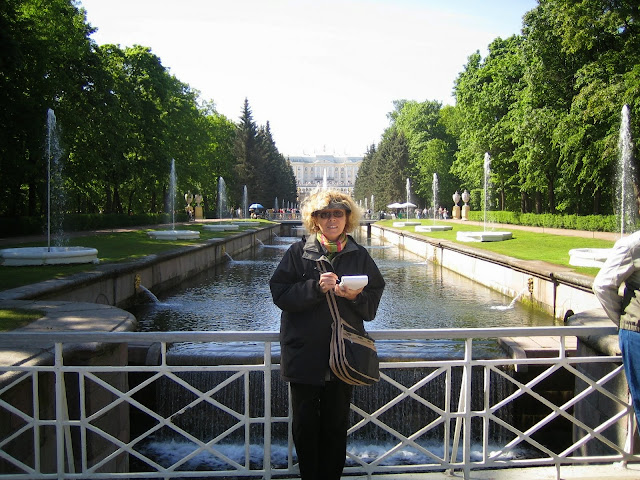In the maelstrom of facts and myths that is history, dates, personages, and events both cataclysmic and small swirl throughout time, gradually losing force as new events take place, new rulers ascend, new wars obliterate memories of past battles.
In the book Empress of the Night, the storied history of Russia’s Catherine the Great comes alive. Details breathed one by one, as written by master storyteller Eva Stachniak, bring history to life – not only vividly, but entrancingly.
Author Eva Stachniak
This extraordinary book captures a life so exquisitely, and in such fine detail - in daily thought, emotion, and purpose - that this venerable Empress becomes a living, breathing person – just like us. She has fears, hopes, dreams, a sense of social justice, a love for beauty - but is also a skilled negotiator, a wise politician, a master of intrigue.
In this book, we see why and how Catherine became great…and how one woman changed the course of a nation – and the world.

I love this book. It’s the perfect read for delving deep into history, for gaining an understanding of someone’s life, and for escaping into a different place and time. I must say that while my book list (and life) has been scarce re: Russian influences, reading this novel has altered that. I cooked Russian food while reading the book, longed for clear, scented pine forests, and imagined my family to be devious spies, out to discover secrets. Luckily for me, not much for them to report except me reading in the hammock lakeside, preparing delicious Russian meals, and exhibiting an intense desire to explore more of Russian history, culture, and literature.
What inspires an author? How does one conduct research, especially for such a history-rich tome as this? I was lucky enough to catch up with author Eva Stachniak, and ask these (and more) questions. Hint: she’s funny, an exhaustive researcher like us, and full of inspiration. Here’s what she had to say…
Please tell us about your new book, Empress of the Night...
Empress of the Night is my second novel inspired by the Russian Tsarina, Catherine the Great. It is not a sequel—since both novels can be read separately—but another entry into Catherine’s story.
My first Catherine novel, The Winter Palace, re-imagined the rise of Catherine the Great through the watchful eyes of her servant and spy. In Empress of the Night, Catherine takes center stage, reliving her astonishing rule over an empire, and the sacrifices that made her the most feared and commanding woman of her time.

What inspired you to write this (and its companion book, The Winter Palace)?
In Poland, where I grew up, Catherine the Great was remembered as the ruthless Russian Tsarina who wiped Poland off the map of Europe. I didn’t know much more about her then. After I moved to Canada, in 1981, I noticed the slew of Catherine biographies in which she was a very different woman than the one I recalled from my childhood. That intrigued me.
My own Catherine the Great fascination began when I was researching my second novel, Garden of Venus, set at the time of Catherine’s rule. This is when I picked up Catherine’s memoirs and discovered another Catherine: an immigrant from Zerbst, brought to Russia at 14 to marry the heir to the throne, a woman who had to fight for her survival at a hostile court.
Author Eva Stachniak, in full Russian court dress.
Let's get down to details - research, research, research! Where did you do research for this book? How long did it take you to research material for this book? What were the challenges you faced, and the best discoveries about Catherine (and/or Russia)?
My research into Catherine’s life started from reading her biographies, and scholarly articles about her and her reign, not just Western, but also Polish and Russian. A year later, I took a trip to St. Petersburg.
I’m a writer who has to see and hear my characters before I can write about them, and locating them in a physical space is essential. I travelled to St. Petersburg in June for I wanted to experience the white nights I’ve read about but never seen.
I visited the Winter Palace, much changed since Catherine’s times, but still imbued with her spirit and her presence. Paintings she collected still hang on its walls. Objects she touched are still there: the peacock clock Prince Potemkin ordered for her in London, a collection of engraved gems she was so fond of.
I visited the Kunstkamera, Peter the Great’s first museum, where deformed fetuses still swim in glass jars, the Petropavlovsky Fortress where so many political prisoners, including Tadeusz Kosciuszko, the hero of both American Revolution and the Polish Uprising of 1794 served time.
Then I ventured outside St Petersburg to the palaces where Catherine spent her summers: Oranienbaum, Tsarskoye Selo, and Peterhof. I also saw the Monplaisir pavilion where where Alexei Orlov woke her up on June 28 1762 to take her to the capital where she would proclaim herself Empress of All the Russias.
My challenges? The wealth of material, the sheer volume of books I had to read and digest. But I am a lapsed academic, and research is in my blood. I managed.

The Tsarskoye Selo palace, Catherine's summer palace (one of many)

Dining room, The Tsarskoye Selo palace

Wedgwood Rooms, the Tsarskoye Summer Palace
How did you take your research and translate it into such an interesting account of a life? What skills do you, as an author have to utilize to recreate such a powerful life into a book that truly shares what that life was like?
After doing my research, I step back, letting all that knowledge, new and old, settle.
This is the time when I need a lot of solitude, a lot of imagining, day-dreaming, thinking. Exciting time, though sometimes scary, for I can never tell how long I need for the novel to emerge out of all the chaos of research.
It is hard to describe how it is done. The process is mostly unconscious. Whenever I listen to actors talking of how they prepare for their roles, I experience a tug of recognition. This is what I do. I become my characters. I dream their dreams, I think her thoughts. And when the process is complete, I sit down and write.

Fortress of St Peter and Paul...two graves, Catherine I and Catherine II.
What's up next for you?
I’m working on a novel inspired by a dancer and choreographer, Bronislava Nijinska, the sister of Vaslav Nijinsky, the God of the Dance. Like the narrator of The Winter Palace, Bronislava was Polish and brought up in Russia where her parents went to seek work. Bronislava graduated from the Imperial Ballet School, but her career flourished in Paris, London, Berlin and Monte Carlo where she danced with Ballets Russes and other companies and where she choreographed her masterpieces: Les Noces, Le Train Bleu, Les Biches. [Wandering Educators note: Read our interview with Eva about her new book, The Chosen Maiden, here!]
Is there anything else you'd like to share with us?
Just the recommendation to always travel with a book. And not just a travel book but a novel, which can make you feel at home in the city where otherwise you would be a tourist only. Visit St. Petersburg with Catherine the Great, or characters of Dostoyevsky, or memoirs of Vladimir Nabokov. See the city with their eyes, note how it has changed.
It is worth it.

Author Eva Stachniak doing research in Russia
Learn more at http://www.evastachniak.com/
All photos courtesy and copyright Eva Stachniak.
Note: We were sent a review copy of this book by the publisher, Bantam - thank you!
